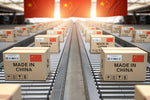
What are the effects of Compatible Printer Cartridges?
, by Planet Green, 3 min reading time

, by Planet Green, 3 min reading time
The printer ink cartridge industry has long been plagued by the presence of third-party manufacturers who produce clone or compatible ink cartridges.
The printer ink cartridge industry has long been plagued by the presence of third-party manufacturers who produce clone or compatible ink cartridges. These items are rapidly sold through websites like Amazon, Ebay and Wal-Mart.com, diminishing the potential for a circular economy and a reduction in plastic waste. While these imported compatible cartridges may seem attractive due to their low initial cost, when compared to original equipment manufacturer (OEM) or remanufactured cartridges, it is essential to recognize their environmental and economic impact to the United States.

Unlike OEM cartridges, aftermarket generic compatible printer cartridges are single-use products; or what’s worse, they are often labeled as recyclable, but they simply aren’t. Chinese manufacturers list items on Amazon as both being remanufactured from the start and as being recyclable after use when in fact, they are new manufactured clones with no outlet for recycling after use.
This disposability mindset contributes significantly to the growing problem of plastic waste in the world. It is estimated that 375 million empty ink cartridges are disposed of in U.S. landfills on an annual basis: upwards of 1 million per day in the US alone. That’s well more than a truckload of trash. Without proper recycling and remanufacturing processes in place, these cartridges end up in landfills after a single use, exacerbating the environmental challenges associated with waste management. The widespread sale of these items and the influx of product coming into the US from China, through Amazon and other related websites, has caused a rapid decline in the remanufacturing industry, costing US jobs, breaking a circular economy and producing untold amounts of waste at the cost of our environments health.

These third-party ink cartridge manufacturers shirk responsibility when it comes to the proper disposal and recycling of their cartridges. Unlike OEM manufacturers who typically offer return programs to reclaim their empty cartridges or have established partnerships with recycling initiatives, third-party compatible clone cartridge manufacturers do not prioritize the end-of-life management of their products. This lack of accountability further contributes to the accumulation of single-use trash in landfills. Consumers buy the products and are left with no means to send them back for recycling and after their single use, they are thrown out. This is due in part to the fact that clone compatible cartridge manufacturers are not in the business of recycling or remanufacturing. They are in the business of manufacturing for profit.
Another primary concern surrounding third-party ink cartridges is their infringement on OEM patents. In their haste to replicate OEM products to get to market with a lower cost alternative product, overseas manufacturers will produce products without authorization, compromising the intellectual property rights of OEM manufacturers. As a result, these cartridges often fall short of meeting the same quality standards as their OEM counterparts, leading to potential issues with print quality and printer performance. In addition, there is no post consumable market to recycle or remanufacture aftermarket new built clone cartridges, leaving the empty printer cartridge core with ink and toner residue destined for landfills.
While aftermarket new built compatible ink cartridges may initially provide a few dollars of cost savings for consumers, those savings can be lost in paper wastage from poor printouts, printer damage, or additional cost to replace poor quality inks. The initial savings can further erode to a costly expense in the long-term as municipalities mitigate the impact of plastic waste on the environment. Without proper recycling and remanufacturing practices in place, the disposal of these cartridges perpetuates a linear "take-make-dispose" model that puts a strain on natural resources while contributing steadily to global pollution and greenhouse gas emissions associated with manufacturing and landfill management.
For the betterment of the environment and local economies, it is crucial for consumers to make a conscious choice and opt for U.S. remanufactured printer cartridges over aftermarket clone compatible ink cartridges from overseas. U.S. remanufactured cartridges, like those from www.PlanetGreenRecycle.com, follow stringent quality standards and environmentally friendly practices and come with a 100% customer satisfaction guarantee. By choosing U.S. remanufactured printer cartridges, consumers contribute to a circular economy, where used OEM printer cartridges are reclaimed, remanufactured, and reused pumping money into local economies. This not only reduces the strain on natural resources but also minimizes plastic waste and its associated environmental impacts. By making the switch to U.S. remanufactured ink cartridges, consumers play an active role in preserving our planet for future generations while supporting U.S. businesses and jobs.

Pinellas County, Florida, has taken a significant step in combating plastic waste by adding Planet Green Recycle to its public-facing information website. Residents and businesses...

The Holiday Spirit Meets Sustainability The holiday season is a time for giving, celebrating, and creating memories. It’s also a time when we tend to...

With November 15th being celebrated as America Recycles Day, the Plastics Industry Association (PLASTICS) commemorates Recycling Week this year from November 11th through November 15th...

Plastic pollution has become one of the most pressing environmental issues of our time, impacting land, waterways, and marine life on a global scale. While...